About Our Epilepsy Program:
Epilepsy is a common neurologic disorder, affecting more than 3 million people nationwide and near 100,000 in North Texas. Seizures can manifest in different ways, and symptoms can vary depending on the region of the brain affected. For patients who do have seizures, not knowing when the next seizure will occur, or what one will endure can be life altering. We understand this and realize that finding answers and having a comprehensive care plan is integral in regaining control. Our dedicated team of experts use cutting edge technologies to help identify each patient’s seizure type(s) and create a comprehensive individualized treatment plan to best address each patient’s needs. Our patients not only see a board-certified neurologist to manage their care, but also a fellowship-trained Epileptologist that specializes in seizure diagnosing and management.
Each person with epilepsy has their own unique journey.
We see ourselves as partners who walk this journey side-by-side with you. Care is centered in our outpatient clinic. Our services include medication management, short and long-term video-EEG monitoring, brain imaging, psychiatric and neuropsychiatric assessments, cognitive therapy, clinical trials, and access to social work and support services, including the Epilepsy Foundation of Texas.
For about one-third of patients with epilepsy, seizures continue despite medication treatments. This is where our team particularly excels, capitalizing upon their area of expertise. We have partnered with an adult level 4 Epilepsy Center, the highest level recognized by the National Association of Epilepsy Centers (NAEC). Here, we have the capability to diagnose and treat epilepsy using the most advanced medical and surgical treatments available.

Our Epilepsy Team:
While all our neurologists treat seizures and provide orders for diagnostic testing, they rely on our Epileptologists to care for our patients living with Epilepsy.
Our epilepsy team offers a professional collaboration to improve the patient’s quality of life.
- Consultation with a two year fellowship-trained epileptologist
- Affiliation with Level-4 Epilepsy Center
- Medication review and management
- Neuropsychological testing when needed
- State of the art technology including MRI (with neuro trained radiology readings)
- EEG – Routine, Ambulatory & Long-Term Video EEGs
- Clinical Research providing access to emerging therapies
- Epilepsy surgery consultation and oversight
- Device surgery and management: RNS, VNS
- Physical, Occupational and Speech therapy with neuro trained therapist
Epilepsy Timeline:
1. First Seizure
- Expedited Evaluation by one of our epileptologists that includes history review and diagnostic testing.
- Social impact guidance to discuss driving, work and other social changes.
- Risk assessment to help to identify practical ideas for reducing risk to make situations safer.
- Onsite Diagnostic Testingto include EEG and MRI (with neurologist trained radiologist readings).

2. Another Seizure
3. Recurrent Seizures
- Medication management for seizure control.
- In-house diagnostic monitoring in our state of the art subacute EMU.
- Review of modifiable triggers.
- Memory and Cognitive testing
- PT/OT/ST Evaluation onsite in our therapy center.

4. Breakthrough Seizure
5. Recurrent Seizures Despite Having Tried 2 AEDs

6. Intensive Studies of Seizures in EMU
7. Treatment options outside of medication
- Multi-disciplinary conference to discuss failed interventions and possible treatments
- Level-4 Epilepsy Center oversight for in depth study of the specific type of epilepsy.
- Non-pharmaceutical option consultations such as surgery, laser surgery, VNS, RNS.
- Clinical research providing access to emerging therapies.
- Rehabilitation services post surgical intervention.

8. Continual Support
A seizure occurs when there is a sudden electrical disturbance in the brain. Depending on the type of a seizure, a person may temporarily have involuntary muscle movements and lose awareness or consciousness. The type of seizure a person experiences depends on where the seizure begins in the brain.
Generally, a person is diagnosed with epilepsy after two or more unprovoked seizures, or after a high risk of having another seizure is identified after an initial seizure. Provoked seizures—also known as acute symptomatic seizures—have a clear, immediate cause, such as a stroke or brain injury.
- Auras: These are symptoms that people experience at the beginning of a seizure (see below)
- Loss of consciousness or awareness; syncope
- Confusion
- Jerking, twitching, or other involuntary movements
- Stiffening or jerking of the body, arms, and legs
- Abrupt loss in muscle tone (“drop attacks”), which may lead to falls
If you are diagnosed with epilepsy, your doctor will usually recommend treatment with one or more anti-epilepsy medications. About two-thirds of people with epilepsy have good control of their seizures with medication, and they have few or no side effects.
If you have epilepsy that is not well controlled with medication or if you experience side effects from medication, you might be eligible for other treatments. These treatments include epilepsy surgery, brain stimulation devices, vagal nerve stimulation, and the ketogenic diet. The goal of epilepsy treatment is to be completely seizure free.
Contact Us
We’re here to answer any questions in order to make your appointment easier.
Find a Specialist
Learn more about our fellowship-trained specialists!
NCD Testing Center
Learn more about the testing available for seizures in our Neuro Testing Center.

